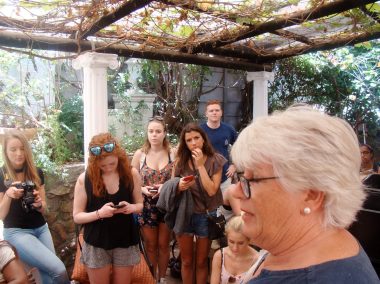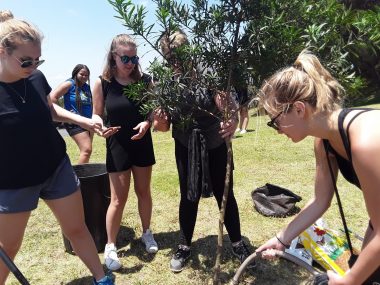Associate Professor of English Prudence Layne is fostering intercultural opportunities for staff members in South Africa and beyond.
 By Owen Covington
By Owen Covington
For Patrick Rudd, the boxes holding more than 7,000 books meant going back to basics. In his role as coordinator of library instruction and outreach services at Elon’s Carol Grotnes Belk Library, Rudd regularly helps students understand the wealth of resources Elon has in its expansive library.
But in January 2015, Rudd and the students in “The Call of South Africa” study abroad course faced a more elemental task—sorting thousands of children’s books into broad categories. They were alphabetizing the books, which had been donated mostly by the Elon program, to help outfit the library in the Ekukhanyisweni Primary School in Alexandra, South Africa, one of the few schools in the region with its own library. “I had never done a service-learning project like this before, and certainly not in another country,” Rudd says of the experience. “For me, the greatest part of study abroad is I was working with students, but we were really learning and doing together.”
Rudd made the journey to South Africa that year, and then again in 2016, at the invitation of Associate Professor of English Prudence Layne, who conceived of and leads the annual Winter Term program. The interdisciplinary course challenges students to consider the role literature and the arts play in a democracy. A central focus of the January program, and its fall semester preparatory course, is comparing the anti-apartheid struggles in South Africa with civil rights struggles in the United States. During the service-learning program, students spend time primarily in Cape Town and the townships surrounding Johannesburg.
Rudd’s inclusion in the program is part of an intentional effort by Layne to help bring the expertise of Elon staff members to bear within the South African communities the program visits during a month of travel and study. The hope is that while sharing their talents in South Africa, they will bring their experiences back to campus and have an additional impact here. “I really wanted to do something different in the South Africa program,” Layne says. “I began to think about elements of the course I wanted to develop that might be out of my areas of expertise, or might provide a professional development opportunity for a staff member. My theory is, a well-designed experience, regardless of the duration, can build and foster intercultural learning.”
Finding the right fit
One of the bedrocks of an Elon education is providing the opportunity for students to study abroad during their time at the university. That extends to providing Elon’s faculty and staff with those types of opportunities as well. Multiple study abroad programs include faculty co-leaders who share organization and instructional duties for international study experiences. Elon also encourages the participation of staff members in support roles for study abroad programs.
What sets Layne’s approach apart is that she has carved out opportunities for staff members to be integral participants. Layne has been deliberate in selecting staff members with specific skills that can offer a broader benefit during the Winter Term program. She has identified opportunities in South Africa for those staff members to develop themselves personally and professionally, with the goal that they return to Elon with new ideas and a broader perspective. “We want staff members to not just throw a dart and say, ‘I’ve always wanted to go to Australia,’ and then hop on board,” Layne says. “What we do as individuals has ripple effects in the world. We want to focus on building individuals and their skills, while using the group dynamic itself as a support mechanism to support their growth.”
Layne’s first selection to participate? Elon President Leo M. Lambert. Before she invited him to play a role in the course in 2010, Lambert had not participated in an Elon study abroad program. His experience in South Africa, which included a meeting with Archbishop Emeritus Desmond Tutu, helped shape the president’s views on what the multifaith experience at Elon could be. “Our class had the opportunity to celebrate morning Mass at St. George’s Cathedral with Archbishop Tutu and to enjoy breakfast with him afterwards,” Lambert says. “One cannot help but be awed by the sense of history in St. George’s—a focal point for people of diverse faiths to come together in opposition to a cruel, unjust and inhumane system of apartheid.”
By getting buy-in for her approach from the top, Layne hoped that university and department leaders would see the value in their staff members participating in a meaningful way in study abroad. “In this case, a trickle-down effect is more effective than coming from the bottom up,” Layne says. That was one motivation for Layne to invite Robert Buchholz, associate vice president for facilities management and director of physical plant, to be part of the program in 2017. Along with the skills and expertise Buchholz would bring to the program, she wanted to get his support for members of his staff to participate in study abroad programs in the future. She had also been impressed with the breadth of recycling efforts she had seen in the South African townships she and her students had visited. In his role at Elon, Buchholz oversees the university’s sustainability efforts, from recycling to planting trees and decreasing waste, and she saw an opportunity for Buchholz to share what the university is doing with those who could benefit in South Africa, while also getting ideas to take back to Elon.
The bulk of Buchholz’s career was spent in the U.S. Navy, where he performed many of the same duties he does for Elon’s campus, but at military properties around the world. Well-traveled from his time in the Navy as well as time spent exploring with his wife, Pam, Buchholz says he had never considered traveling overseas with students. “I asked her, ‘why me?’” Buchholz recalls. “She told me she thought that it would be good for me to come down, see what they did, and maybe find something I could learn and bring back to Elon.”
Meaningful encounters
While in South Africa in January 2017, Buchholz was introduced to Original T-Bag Designs, an organization founded in Cape Town by Jill Heyes to use recycled tea bags as the raw material for a variety of arts and crafts products. The goal of the organization is to encourage local women to express their creativity while earning a living, with Original T-Bag Designs products sold both locally and globally.
 That interaction prompted Buchholz to take the lead on a project on Elon’s campus to gather used tea bags that are then sent to Original T-Bag Designs for their use. The inaugural efforts collected nearly 300 tea bags, which were presented to Heyes during this year’s class visit and tour of the facility. The program’s alumni hope to increase the awareness of this business and sustainable practice.
That interaction prompted Buchholz to take the lead on a project on Elon’s campus to gather used tea bags that are then sent to Original T-Bag Designs for their use. The inaugural efforts collected nearly 300 tea bags, which were presented to Heyes during this year’s class visit and tour of the facility. The program’s alumni hope to increase the awareness of this business and sustainable practice.
Buchholz views the program’s partnerships with organizations in South Africa as another pathway to reduce Elon’s carbon footprint. Transportation for students traveling abroad is the second-largest greenhouse gas-producing activity for the university, and Buchholz was considering ways to offset those activities. Working with Elaine Durr, Elon’s director of sustainability, Buchholz determined the university should explore planting trees abroad to highlight its emphasis on study abroad while helping to reduce the impact from the university’s carbon footprint.
This January saw the planting of 20 yellowwood trees at the University of Cape Town, a site for semester-long study abroad for Elon students. More trees will be planted in the future. “Now we have an international forest,” Buchholz says.
He views the Navy as a service organization, and puts higher education into that same category. Participating in this way in Layne’s course “was just taking that service to another dimension in a way I hadn’t thought of before,” he says.
Reaping the benefits
Layne turned to Rudd to advance work her students had been doing since 2007 to help develop the library in the Ekukhanyisweni Primary School in Alexandra, which sits northeast of Johannesburg. For Rudd, it was an opportunity to do something he has wanted to do for years. “The South African education system, which has gone through revolutionary change, in its current model, does not often have libraries in schools, particularly in township schools” like Ekukhanyisweni, Rudd says.
Rudd signed on to participate in 2015 and 2016 in what would be a two-pronged approach —increasing and organizing the books and resources in the school library and assisting the new librarian to build those connections to the classroom. “In a sense, it was trying to bring life back to this space, and really give it purpose and help the teachers in the school understand this was a resource to be used,” Rudd says.
 Learning about another country and culture side-by-side with Elon students was invaluable for Rudd. He has traveled in Europe, but South Africa awoke in him a desire to know more about the country’s history and place within the larger continent. During one leg of the return flight from South Africa, he sat next to a student, and they spent the eight-hour stretch sharing their thoughts about the experience they had just had, and how it was shaping their worldviews. “You’re confronted with things that are challenging, and sometimes you and the student are equally challenged,” Rudd says. “Those are pretty powerful things, as you see how students learn outside the traditional classroom environment.”
Learning about another country and culture side-by-side with Elon students was invaluable for Rudd. He has traveled in Europe, but South Africa awoke in him a desire to know more about the country’s history and place within the larger continent. During one leg of the return flight from South Africa, he sat next to a student, and they spent the eight-hour stretch sharing their thoughts about the experience they had just had, and how it was shaping their worldviews. “You’re confronted with things that are challenging, and sometimes you and the student are equally challenged,” Rudd says. “Those are pretty powerful things, as you see how students learn outside the traditional classroom environment.”
Rudd was able to share his expertise to help rejuvenate the library in Ekukhanyisweni Primary School, and took much away from his two visits to South Africa. When he assists students with research, he now asks deeper questions about what voices might be missing from the resources he connects them with, and more closely examines who is creating the narrative. “It was a very powerful experience personally in better understanding my own country, and its past,” he says.
“That’s the real value of study abroad, when it works well—you can’t help but come back and tell others about what you experienced. Even though I’m no expert, and I don’t have all the answers, I can at least share what I observed. I feel called to do that.”


